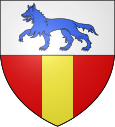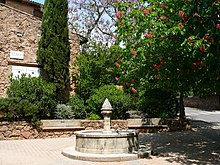La Motte (Var)
| La Motte | ||
|---|---|---|

|
|
|
| region | Provence-Alpes-Cote d'Azur | |
| Department | Var | |
| Arrondissement | Draguignan | |
| Canton | Flayosc | |
| Community association | Dracénoise | |
| Coordinates | 43 ° 30 ' N , 6 ° 32' E | |
| height | 10-320 m | |
| surface | 28.12 km 2 | |
| Residents | 2,845 (January 1, 2017) | |
| Population density | 101 inhabitants / km 2 | |
| Post Code | 83920 | |
| INSEE code | 83085 | |
| Website | www.lamotteenprovence.com | |
La Motte is a French commune with 2,845 inhabitants (at January 1, 2017) in the department of Var in the region Provence-Alpes-Cote d'Azur . It belongs to the Arrondissement of Draguignan and the Canton of Flayosc .
geography
La Motte lies on the edge of a fertile plain that is well irrigated by rivers and canals, protected by the Rousset and Peyblou, the wooded hills in the north of the municipality. To the east, La Motte is bordered by the Endre , which has been partially integrated into a golf course. In the south of the village is the small river Nartuby, which forms a 22 meter high waterfall at the Saut du Capelan .
Marked hiking trails lead from the village into the Scots pine forests in the area to the Massif du Peyblou , Le Plateau and Les Garassins .
history
The area of La Motte was already settled in Roman times. The current name first appears in 1030 as La Mota . In documents from the 11th and 12th centuries, the place was called Motta-Lamberti . In 1044 Viscount Guillaume de Marseille gave the place of the Abbey of Saint-Victor as a fief . The Motta priory ( Moutto in Provençal ) was ceded by the Saint-Victor chapter to Abbot Le Blance, the prior of La Celle, in exchange for another area. The rule later passed to the Villeneuve family and was eventually bought back by the municipality.
On August 15, 1944, Allied parachutists landed as part of Operation Dragoon at 2:30 am in the hamlet of Mitan, which belongs to La Motte, and set up the American General Staff there. In this way, La Motte became the first liberated place in Provence.
economy
The region is characterized by a diverse agriculture. Vineyards, olive groves, orchards, melon fields and greenhouses with roses, carnations and chrysanthemums determine the landscape and economic life. The quality wines, some of which are produced cooperatively, are allowed to carry the AOC Côtes de Provence seal of approval . Agriculture is complemented by silkworm breeding and fish cultures.
Parish partnership
Since 1983, the municipality has been linked by a partnership with the medieval town of Saint-Ursanne at the Clos du Doubs in the Swiss canton of Jura .


